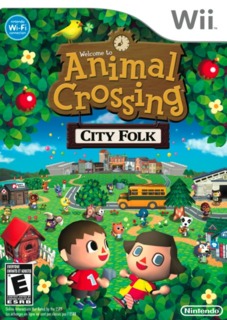More of the same makes starting a new life not as exciting as it should be.
The game starts on a bus where questions posed by a talking cat determine what each player will look like, and what town the player is moving to. After the player realizes he's $19,000 in debt, the game moves at a slow pace, allowing the player to do whatever he likes.
There is no story, just various activities to do. Each town is different, and has different animal neighbors to interact with. They all have differently decorated houses, different dialogue, and can even move away. Each town does have a few buildings in common, like an empty museum, a bus station, and the town hall.
The museum is empty at first, but one of the many goals in the game is for the player to fill it up by scouring throughout the town, finding all the bugs, fish, and dinosaur fossils. Another goal is to create the perfect house by buying new furniture to decorate it with. After paying off all the debt, the player can add on to their house, leaving them in more debt. Every day, a letter is sent to the house informing the player how good their house is, and how they can improve it.
Being a sequel, City Folk does a few things differently from its two predecessors. The biggest difference is the addition of a small city that can be traveled to by bus. The city is a small plaza containing various shops. All it does though is make it easier for the player to get items that were harder to get in the previous versions.
Online has returned, but with a twist. Players can visit their friends' towns and fish or do other things with them as always, but this time they can chat using the Wii's Wii Speak periferal, which is much easier than having to use text chat like before.
Other than that, City Folk is more of the same, and in a disappointing way. Though the causal goal setting and witty dialogue are entertaining, there's nothing that sets City Folk apart.
The controls, a major selling point of Wii games, are the DS version's controls emulated through the pointer on the remote, except this time there is no alternative to use a controller pad.
The pasty, colorful graphics that have become a series staple are the same this time around, which is sad considering many more things could be done with City Folk's considering the Wii is so much more powerful than the Gamecube and DS. Even the songs have been recycled this time around, with lazy, cheerful polka tunes jingling in the background.
Overall, Animal Crossing City Folk, is a relaxing casual game that can be player over and over, because it never ends. Like always, it's fun to have friends and family move into the town and see how they react when the player isn't around, but nothing has changed.
For 50$, City Folk is a terrific value considering each day is different and the game is in real time. Unfortunately, players of the previous games will be turned off by the staleness of the series. Hopefully in the next installment, Nintendo will breathe a fresh breath of life into Animal Crossing with new features.

